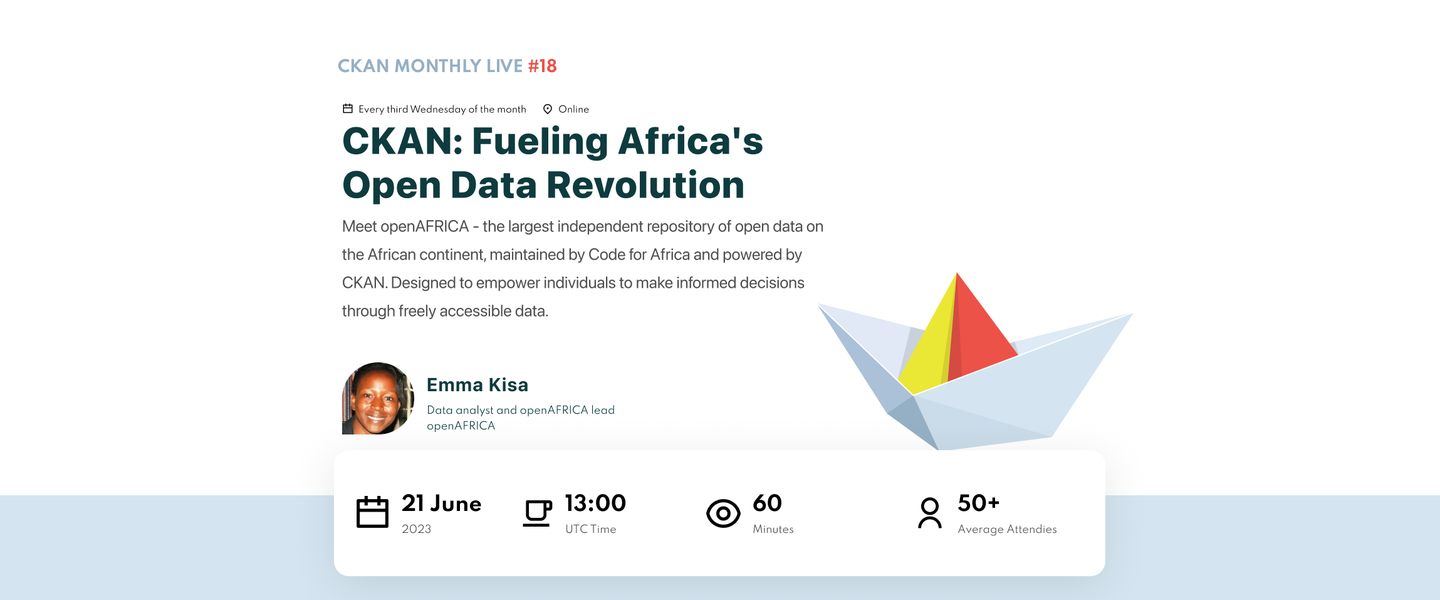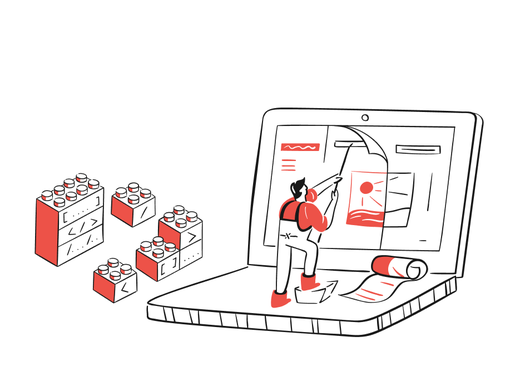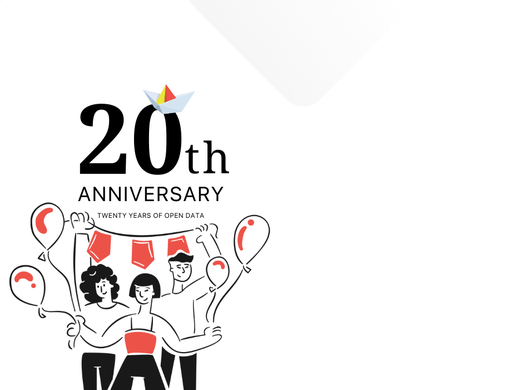Eager to get straight into the heart of our latest webinar? Click this link to access the recording.
Our June 2023 CKAN Monthly Meetup #18 was buzzing with lively discussions, important updates, and an impressive presentation by Emma Kisa, Data Analyst and openAFRICA's Lead at Code for Africa. Delving into the current open data wave in Africa, she shed light on the power of strategic alliances and collaboration, the importance of data liberation, and the vital role that CKAN plays in spearheading this paradigm shift. Highlighting that freeing data can create a real impact, Emma underlined the key role CKAN holds in conducting this orchestration of change.
If you missed the meetup or simply want a refresher on the key takeaways, here's a concise recap:
📢 The meetup kickstarted with a few important announcements by Yoana:
- 📰 CKAN Monthly Newsletter: The new monthly newsletter has been issued. You can check it out on our blog or LinkedIn, and if you wish to subscribe, you can do so via this link: ckan.org/newsletter/subscription.
- 🎉 Exciting news: CKAN has been recognized as a digital public good! The application was made by the Open Knowledge Foundation (OKF), and the endorsement came from the Digital Public Good Alliance. This recognition signifies CKAN's role in addressing seven of the United Nations' 17 Sustainable Development Goals - a significant achievement for our project!
- 🥇 The POSE project update: As many of you know, the University of Pittsburgh and datHere have been diligently working on the CKAN ecosystem. They have won a grant by the U.S. National Science Foundation’s Pathways to Enable Open-Source Ecosystems (POSE) program. After successful discovery interviews during Phase One, they are now inviting contributions for Phase Two, which includes sense-making workshops. Find out more and register here. For further reading, we recommend exploring our insightful articles:
📢 After that, Alex gave an update on the progress toward CKAN 3.0:
- 🚀 CKAN 3.0 Taskforce team is diligently working on filling the backlog, which will form the basis for the roadmap to CKAN 3. These issues are publicly available on the CKAN Taskforce Board on GitHub.
- 💡 Open discussions and feedback are helping shape the new version. With several ongoing discussions, more input is welcomed to push issues into the solution and delivery stages.
- 👥 Alex emphasized that this is the right time for companies to participate in the development of the new version of CKAN. The aim is to make CKAN more accessible and efficient, and contributions from the community will be a significant part of that progress.
💡 As the meetup moved forward, Emma Kisa, was all set to present next. Emma's presentation was packed with invaluable insights on the status of open data in Africa and the work of Code for Africa and openAFRICA. Here are the key takeaways:
- Debunking the Data Myth in Africa: Contrary to the prevailing misconception, Africa generates a significant volume of data. The challenge lies not in the absence of data, but its inaccessibility – much of it is stored inefficiently in physical formats, impeding its potential for reuse and analysis.
- Open Data – An Essential Resource: Emma spotlighted the critical role of open data in Africa, especially considering its current data storage predicament. She shared an alarming insight: if a significant number of hyperlinks in reputed outlets like the New York Times are inaccessible, the situation in Africa is expectedly graver. Open data has indispensable value for journalists, policymakers, and researchers, serving as a solid foundation for problem-solving, trend prediction, and thorough analysis.
- Open Africa – The Grand Repository: Championed by Code for Africa, Open Africa aspires to be Africa's most extensive volunteer-led open data platform. Its mission? To create the largest independent repository of open data on the African continent, offering diverse data from numerous countries, and thus fostering cross-country comparisons and collaborations.
- Leveraging Data Usability: With Open Africa, users can upload data in a variety of formats – from CSV and Excel to JSON, link to existing data sheets via APIs, download data for reuse, discover difficult-to-access datasets, and even request specific data. The platform's key features, according to Kisa, are: data upload, data request, multilingual datasets, dataset requests, and community contributions.
- Empowering Users and Ensuring Data Integrity: Open Africa empowers its users to independently upload and maintain datasets, thereby democratizing data sharing and broadening the information base. While user participation is encouraged, all datasets undergo rigorous vetting to ensure data integrity and quality.
- Interactive Platform Features: With the data request feature, Open Africa promotes dynamic interaction between its users and the platform, allowing users to request unavailable datasets, which the team then strives to source and share.
- Embracing Linguistic Diversity: While the majority of datasets are in English, the platform recognizes and caters to Africa's multilingualism, featuring French datasets from Francophone countries like Senegal, Morocco, and Cameroon.
- Functional and High Demand: The platform has received 122 dataset requests, attesting to its functionality and demand. However, Kisa noted that this count only includes requests made through the platform, with additional requests received via a separate form.
- The Role of the Community: The community is at the heart of Open Africa, with over a thousand members contributing data, making requests, and continually enriching the repository.
- Partnerships and Reach: Open Africa's extensive range of partners, from environmental investigative units to organizations providing rural water supply data, underscores the platform's far-reaching influence and versatility.
- Why CKAN? CKAN was Open Africa's platform of choice due to its feature set, which aligns seamlessly with Open Africa's mission of promoting open data and maintaining a diverse data repository. Independent data uploads, the data request feature, and the platform's empowering role in various projects were among the key benefits highlighted.
Q&A session
Q: Are you also harvesting from different CKAN portals? Or is everything being uploaded to one central portal for the different member countries? A: Open Africa confirmed that they harvest data from various CKAN portals. They utilize multiple APIs on the platform and also allow direct data uploads.
Q: Do you have a standard schema that everybody uses or do you just use the standard metadata schema? A: Open Africa does not impose a standard schema. However, they have specific criteria for data uploads, particularly concerning metadata.
Q: Did you customize the standard schema provided by CKAN or just use the one that came with it? A: Open Africa slightly customized the standard schema for a partner in South Africa. But for their own platform, they primarily use the original CKAN schema.
Q: Who's behind Open Africa? How many developers, data stewards, publishers? A: Open Africa is managed by a two-tier team consisting of data analysts and a data lab tech team. They have six data analysts and six tech team members.
Q: How to prepare data, such as data classification? A: Open Africa verifies organizations before granting them access. Training is provided on data upload and presentation to ensure proper data classification.
Q: Is there a centralized system database through which everything is going to seek? A: Open Africa conducts training for organizations on how to upload and manage datasets. They do not rely on a centralized system database.
Q: Is there some process for vetting individually uploaded data before it's made public? How does Open Africa verify data providers or contributors and ensure the accuracy and integrity of the data they contribute? A: Open Africa does not vet data before it goes public. However, they verify the organizations before granting access. Regular checks are conducted to ensure compliance with open data standards and to prevent misinformation.
Q: What's your greatest success story with a data publisher or an organization? A: Open Africa's notable success story involves liberating gazette data from Nigeria and Kenya, made possible by their extensive presence and dedication to open data.
Q: What were the main challenges and improvements in development? A: The main challenge Open Africa faced was lagging behind in upgrading CKAN versions. They are currently running version 2.8.7 and plan to upgrade soon.
Q: How are filters used in the platform and are they noticeable to users? A: Open Africa acknowledges that the filters need better positioning for user visibility. They are working on redesigning the site to make filters more prominent.
Q: How has the experience been with the dataset issue tracker? A: Open Africa's dataset issue tracker feature is underutilized currently. They hope for increased usage as open data and Open Africa gain more traction.
Q: How is Open Africa dealing with spam? A: Open Africa manages spam manually, which is a time-consuming task. They are actively seeking an automated solution to address the issue.
Q: What are the future plans for data collection? A: Open Africa plans to collect microdata and statistics from African countries' statistical agencies. Some data has already been uploaded.
Q: Can CKAN be used as a metadata catalog? A: CKAN can indeed function as a metadata catalog and does not require mandatory DOI minting.
Q: How does Open Africa ensure compliance with data regulations across different African countries? A: Open Africa is constantly learning and working towards creating a compliance document based on the latest guidelines to ensure data regulation adherence.
Conclusion
Emma Kisa's enlightening presentation painted a vivid picture of the open data landscape in Africa. By busting myths and spotlighting the real challenges of data access in Africa, she reiterated the crucial role of open data platforms like openAFRICA in driving socio-economic development. With its remarkable features, dedication to data integrity, and recognition of linguistic diversity, openAFRICA is setting a high bar in the realm of data sharing and usage. As the platform evolves and amasses a more diverse array of datasets, it is all set to become an indispensable asset for journalists, researchers, policymakers, and individuals committed to making a tangible difference in Africa. The power of open data is undeniably transformative, and openAFRICA, running on CKAN, is a testament to this, leading the charge in Africa's open data revolution.
Speaker
- Emma Kisa
Data analyst at Code for Africa and openAFRICA lead - Emma Kisa is a seasoned data analyst with Code for Africa's Knowledge team with 13 years of experience in media and communication. She is a Uganda National Journalism Nominee 2017 in the Data Journalism category, and has contributed to numerous award-winning projects. On top of her professional achievements, Emma also has a strong passion for Early Childhood Development.
- Xavier Frankline
DevOps and Backend Engineer at Code for Africa - Xavier Frankline is a passionate DevOps and Backend Engineer with a strong focus on continuous integration and deployment. With expertise in Python, AWS, Docker, and Kubernetes, Xavier is well-versed in building scalable and reliable infrastructure. His insightful work on openAFRICA provides valuable insights into various tech topics.
How to connect
Recording available
Click this link to access the recording.


